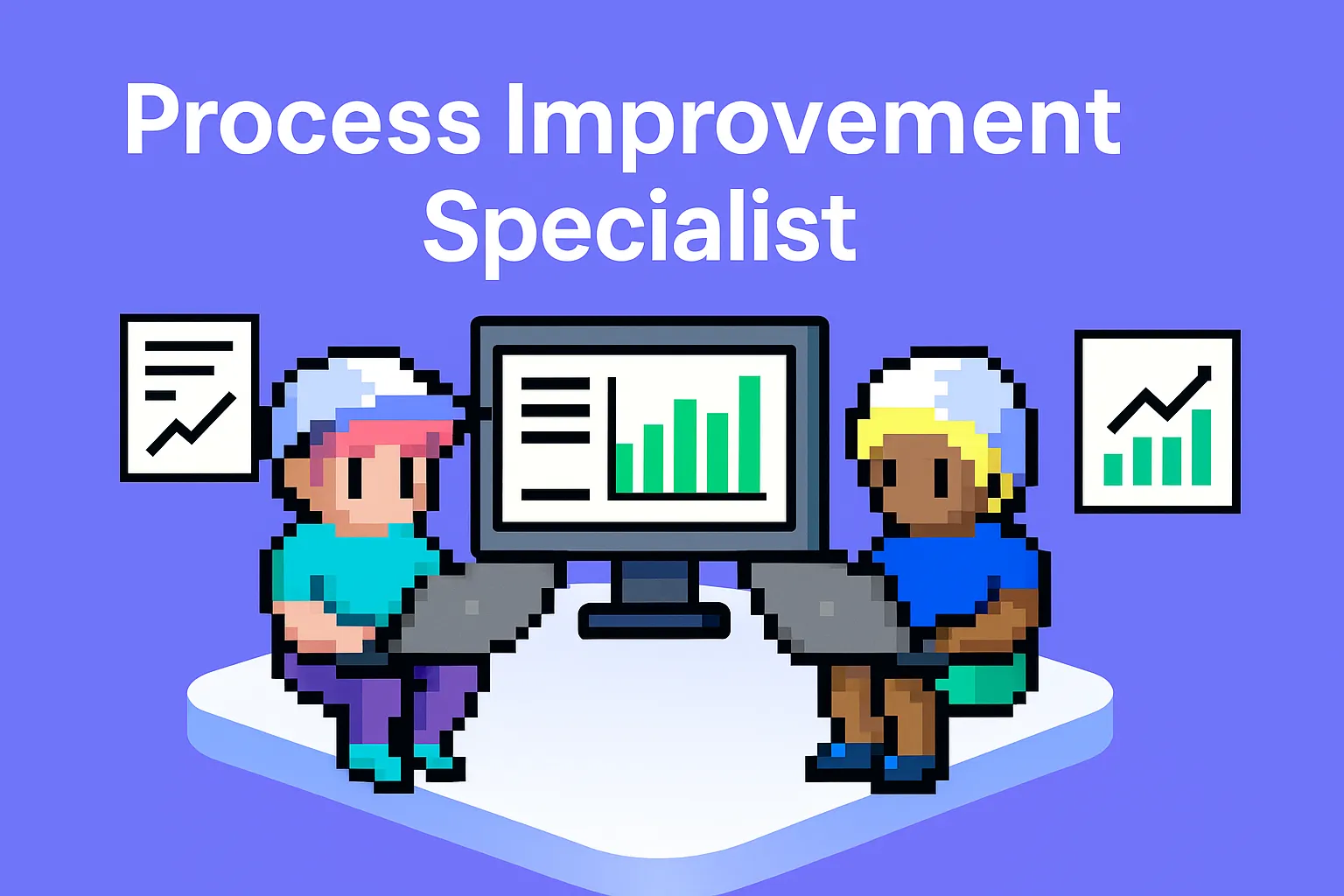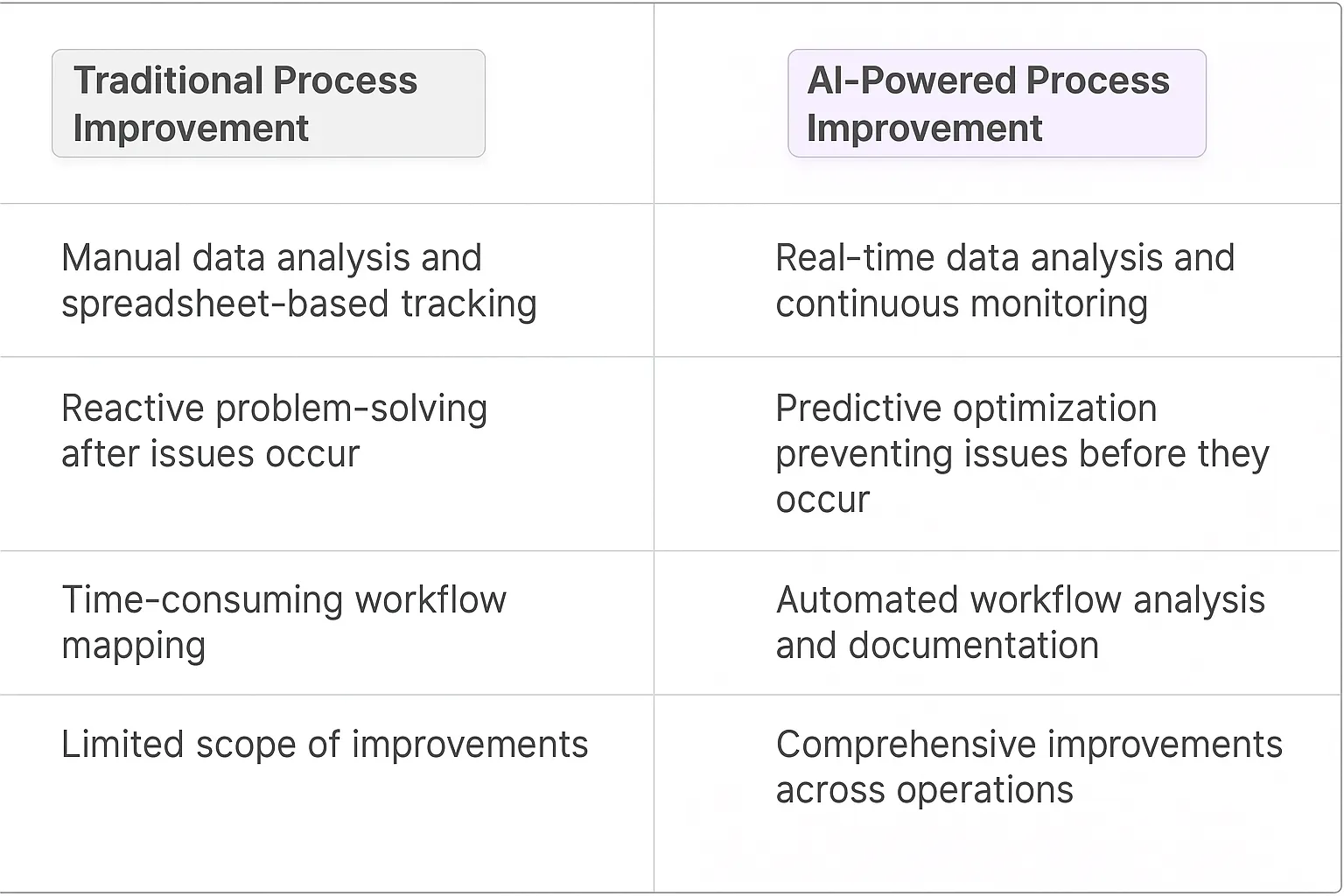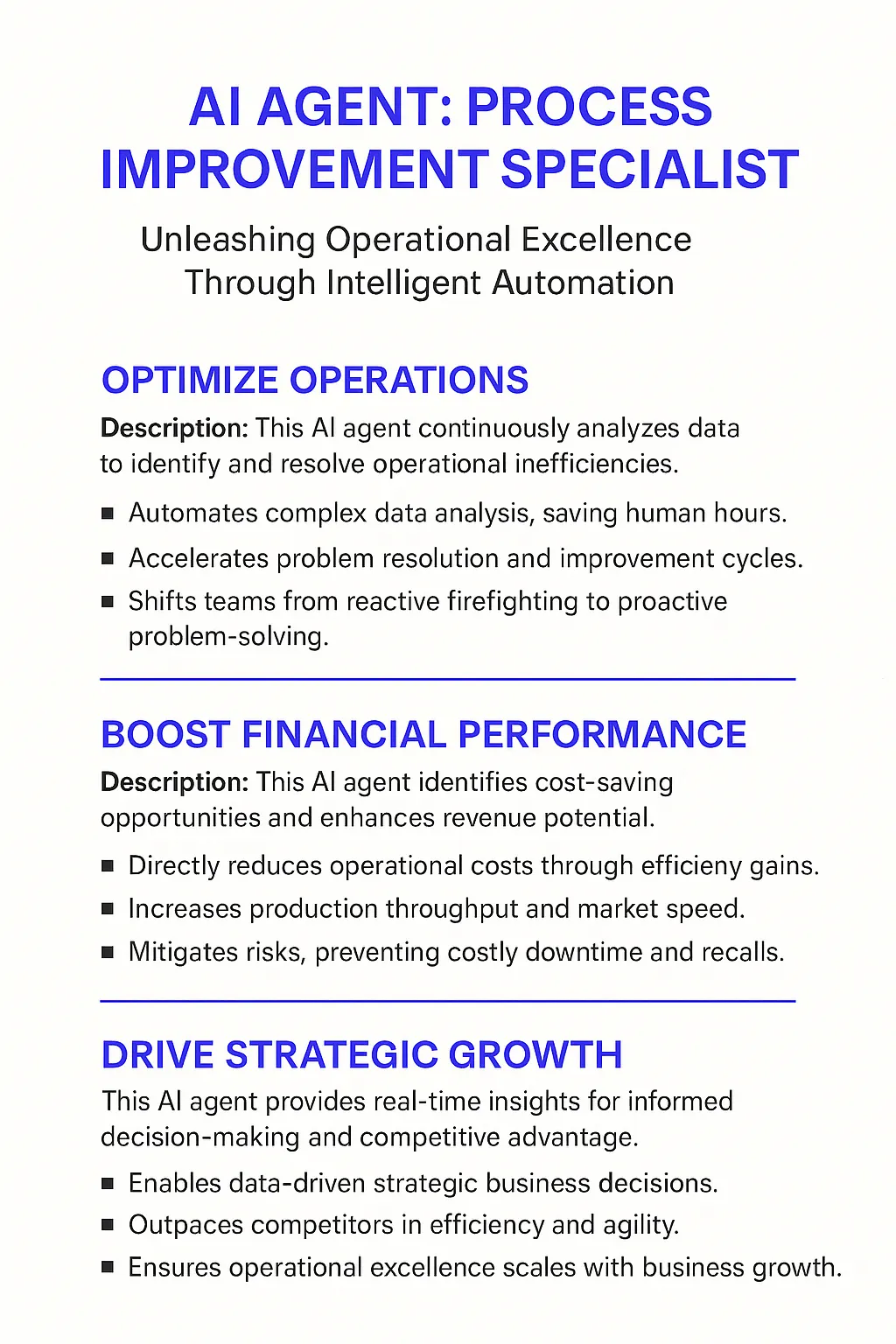Process Improvement Specialist is a cutting-edge AI-powered system designed to optimize business operations. It's not just a tool; it's a digital teammate that works tirelessly to identify inefficiencies, propose solutions, and continuously learn from each interaction. This AI agent dives deep into your organization's data, processes, and workflows, uncovering insights that would take human analysts months to discover.
1. Real-time Analysis: Process Improvement Specialist doesn't just look at historical data; it lives within your processes, analyzing them as they happen.
2. Predictive Optimization: Using advanced machine learning algorithms, it anticipates potential issues before they occur, allowing for proactive problem-solving.
3. Holistic Process Understanding: It integrates data from multiple sources across your organization, providing a comprehensive view of your entire operational ecosystem.
4. Personalized Recommendations: The AI tailors its suggestions to specific teams or individuals, optimizing workflows at a granular level.
5. Continuous Learning: Unlike static tools, Process Improvement Specialist evolves with your business, constantly refining its recommendations based on new data and outcomes.
6. Scenario Modeling: It can simulate various process improvements, allowing you to test hypotheses without risking real-world implementation.
7. Scalability: As your business grows, Process Improvement Specialist scales effortlessly, maintaining consistent optimization across expanding operations.

Before AI agents entered the scene, process improvement specialists relied on a mix of manual analysis, spreadsheets, and basic automation tools. They'd spend countless hours poring over data, conducting interviews, and mapping out workflows. It was a time-consuming and often error-prone approach that limited the scope and speed of improvements.
Teams would use traditional business process management (BPM) software, which, while helpful, lacked the adaptive intelligence to keep up with rapidly changing business environments. These tools were static, requiring constant manual updates and reconfiguration.
AI agents are game-changers for process improvement. They're like having a team of tireless, data-hungry analysts working 24/7 to optimize your operations. Here's why they're transformative:
1. Real-time analysis and adaptation: AI agents don't just analyze processes; they live within them. They continuously monitor workflows, identifying bottlenecks and inefficiencies as they happen. This real-time insight allows for immediate adjustments, creating a dynamic, self-improving system.
2. Predictive optimization: By leveraging machine learning, AI agents can forecast potential issues before they occur. They're not just reacting to problems; they're anticipating and preventing them. This proactive approach minimizes downtime and maximizes efficiency.
3. Holistic process understanding: AI agents can integrate data from multiple sources across an organization. This comprehensive view allows for improvements that consider the entire ecosystem, not just isolated processes. It's like having a bird's eye view of your entire operation, with the ability to zoom in on any detail.
4. Personalized process recommendations: These digital teammates learn from each interaction and user behavior. They can tailor process improvements to specific teams or even individual employees, optimizing workflows at a granular level.
5. Continuous learning and improvement: Unlike traditional tools that require manual updates, AI agents evolve with your business. They learn from every process execution, constantly refining their recommendations and actions.
6. Enhanced decision-making support: AI agents provide data-driven insights that empower process improvement specialists to make more informed decisions. They can simulate different scenarios and predict outcomes, allowing for strategic process redesigns with confidence.
7. Scalability and consistency: As your business grows, AI agents can scale effortlessly, ensuring consistent process optimization across expanding operations. They maintain a standard of excellence that's hard to achieve with human efforts alone.
The integration of AI agents in process improvement is not just an upgrade; it's a fundamental shift in how we approach operational excellence. It's the difference between navigating with a paper map and using a GPS that updates in real-time, suggests the best routes, and learns from traffic patterns. In the world of process improvement, AI agents are that GPS, guiding businesses towards peak efficiency with unprecedented precision and adaptability.

Process improvement is the lifeblood of any growing organization. It's where the rubber meets the road in terms of efficiency gains and competitive advantage. AI agents, or as I like to call them, digital teammates, are becoming indispensable in this arena. They're not just tools; they're partners in the quest for operational excellence.
Let's dive into some concrete examples of how these AI-powered allies can revolutionize process improvement:
When it comes to specific tasks, AI agents are proving to be game-changers in process improvement. They're not just handling routine work; they're augmenting human capabilities in ways that were once the stuff of science fiction. Here are some tasks where AI agents are making a significant impact:
The beauty of these AI-powered process improvement capabilities is that they're not replacing human expertise – they're amplifying it. They're freeing up human minds to focus on the creative, strategic aspects of process improvement while handling the heavy lifting of data analysis and routine tasks.
As we look to the future, the synergy between human ingenuity and AI capabilities in process improvement is going to be a key differentiator for successful organizations. Those who embrace these digital teammates will find themselves with a significant edge in the relentless pursuit of operational excellence.

Process improvement specialist AI agents are reshaping how businesses optimize their operations across diverse sectors. These digital teammates aren't just tools; they're catalysts for transformation, capable of dissecting complex workflows and uncovering hidden inefficiencies. Let's dive into some industry-specific scenarios where these AI agents are making waves, demonstrating their ability to elevate processes and drive tangible results.
From manufacturing floors to healthcare systems, these AI-powered process gurus are becoming indispensable partners in the quest for operational excellence. They're not replacing human expertise but amplifying it, offering insights that might take teams months to uncover in a fraction of the time. As we explore these use cases, you'll see how these digital teammates are redefining what's possible in process improvement, pushing the boundaries of efficiency and innovation in ways that were once the stuff of science fiction.
Let's talk about how Process Improvement Specialist AI agents are about to flip the script in manufacturing. These digital teammates aren't just crunching numbers; they're becoming the unsung heroes of the factory floor.
Picture a sprawling automotive plant. Traditionally, process improvement meant teams of engineers poring over data, walking the floor, and piecing together insights over weeks or months. Enter the AI Process Improvement Specialist. This digital teammate is constantly analyzing real-time data from every corner of the operation - from supply chain logistics to assembly line efficiency, quality control, and even energy consumption.
What's game-changing here is the AI's ability to spot patterns and inefficiencies that human experts might miss. It's not just looking at obvious bottlenecks; it's identifying subtle correlations between seemingly unrelated processes that could be costing millions in lost productivity.
For example, the AI might notice that minor fluctuations in humidity on Tuesdays correlate with a 0.5% increase in defect rates on Thursdays. It's the kind of insight that would take a human team years to stumble upon, if ever.
But here's where it gets really interesting. These AI agents don't just identify problems; they propose and simulate solutions. They can run thousands of virtual scenarios to optimize processes, predicting outcomes with uncanny accuracy. Want to know the ripple effects of changing a supplier or tweaking the assembly line speed? The AI has you covered, complete with projected ROI and potential risks.
The result? A manufacturing process that's not just lean, but practically prescient. Waste reduction, quality improvements, and efficiency gains that continuously compound. It's like having a team of the world's best process engineers working 24/7, but at a fraction of the cost.
This isn't just incremental improvement; it's a fundamental shift in how we approach manufacturing optimization. The factories that embrace these AI Process Improvement Specialists won't just be more efficient - they'll be operating in a different league altogether, setting new benchmarks for what's possible in modern manufacturing.
The financial services industry is about to experience a seismic shift, thanks to Process Improvement Specialist AI agents. These digital teammates are set to redefine how investment firms operate, particularly in the realm of quantitative analysis and trading strategies.
Quantitative analysis has always been about finding patterns in vast seas of data, but human quants are limited by time, cognitive biases, and the sheer volume of information. AI Process Improvement Specialists don't have these limitations. They can analyze market data, economic indicators, and company financials at a scale and speed that's simply impossible for human analysts.
But here's where it gets really interesting: these AI agents aren't just faster - they're smarter in ways we couldn't have imagined a few years ago. They're identifying complex, non-linear relationships between seemingly unrelated factors. For instance, an AI might discover that a combination of weather patterns in Southeast Asia, social media sentiment about a celebrity endorsement, and fluctuations in rare earth metal prices can predict short-term movements in tech stocks with surprising accuracy.
These AI agents are also continuously learning and adapting. They're not static models; they're dynamic systems that evolve with the market. They can detect regime changes - those pivotal moments when historical patterns break down - far quicker than human analysts, allowing firms to adjust strategies in near real-time.
Moreover, these digital teammates are revolutionizing risk management. They're running millions of Monte Carlo simulations every second, stress-testing portfolios against scenarios that human risk managers might never even consider. They're not just looking at standard market risks; they're factoring in complex geopolitical events, climate change scenarios, and even potential technological disruptions.
The impact on trading strategies is profound. We're moving beyond simple algorithmic trading to a world of AI-driven adaptive strategies that can navigate market complexities with unprecedented sophistication. These strategies don't just react to market conditions; they anticipate them, often making moves that seem counterintuitive to human traders but prove prescient in hindsight.
For investment firms, the competitive advantage offered by these AI Process Improvement Specialists is immense. It's not just about making better trades; it's about fundamentally improving every aspect of the investment process, from research and analysis to execution and risk management.
The firms that successfully integrate these AI agents won't just be more profitable - they'll be operating on a different playing field entirely. They'll have insights that others can't see, react to market changes before they fully materialize, and manage risk with a level of precision that was previously unthinkable.
This isn't just an incremental improvement in quantitative finance; it's a quantum leap. The quants of tomorrow won't be individual geniuses with PhDs in physics; they'll be teams of humans working in symbiosis with AI agents, pushing the boundaries of what's possible in financial analysis and strategy.
As this technology matures, we're likely to see a widening gap between firms that embrace these AI Process Improvement Specialists and those that don't. It's not just about having better tools; it's about fundamentally reimagining how investment decisions are made. The future of finance is AI-augmented, and it's arriving faster than most people realize.
Implementing a Process Improvement Specialist AI Agent isn't just about plugging in some fancy algorithm and watching the magic happen. It's a complex dance of data, systems, and human expertise. First off, you're dealing with the nitty-gritty of data integration. Your AI needs to tap into multiple systems - ERPs, CRMs, project management tools - you name it. And let's be real, these systems often speak different languages. Getting them to play nice is like herding cats.
Then there's the issue of data quality. Garbage in, garbage out, right? Your AI is only as good as the data it's fed. And in many organizations, data is scattered, inconsistent, and sometimes just plain wrong. Cleaning this up isn't just a one-time thing; it's an ongoing battle.
Let's not forget about scalability. Sure, your AI might work great in a controlled environment with a limited dataset. But can it handle the firehose of data from a global operation? Can it adapt to new processes and systems as your business evolves? These are the questions that keep CTOs up at night.
On the operational side, we're talking about a fundamental shift in how work gets done. You're essentially introducing a new team member - one that never sleeps, never takes a coffee break, and can process information at superhuman speeds. Sounds great, right? Well, not so fast.
First, there's the human factor. Your employees might view this AI as a threat. Will it take their jobs? Will it make their hard-earned expertise obsolete? Managing this fear and resistance is crucial. You need to position the AI as a tool that enhances human capabilities, not replaces them.
Then there's the challenge of trust. Can your team trust the AI's recommendations? How do you build confidence in its decision-making process? This isn't just about the accuracy of the AI; it's about transparency and explainability. Your team needs to understand not just what the AI is recommending, but why.
Lastly, there's the issue of governance. Who's responsible when the AI makes a mistake? How do you ensure it's operating within legal and ethical boundaries? As AI becomes more integrated into critical business processes, these questions become increasingly important.
Implementing a Process Improvement Specialist AI Agent is a journey, not a destination. It requires a delicate balance of technical know-how, change management skills, and a deep understanding of your business processes. But get it right, and you're looking at a potential game-changer for your organization.
Process Improvement Specialist AI Agents are not just the future of operational excellence; they're the present. These digital teammates are redefining what's possible in process optimization across industries. From manufacturing floors to trading desks, they're uncovering insights, predicting outcomes, and driving efficiencies at a scale and speed previously unimaginable.
As we move forward, the integration of Process Improvement Specialist AI Agents will likely become a key differentiator in competitive markets. Companies that embrace this technology will operate on a different level, setting new benchmarks for efficiency and adaptability. Those that don't risk being left behind.
The challenges in implementing these AI agents are real - from technical hurdles to operational and cultural shifts. But the potential rewards are too significant to ignore. We're standing at the cusp of a new era in process improvement, where the synergy between human ingenuity and AI capabilities will drive unprecedented levels of operational excellence.
The question isn't whether Process Improvement Specialist AI Agents will transform your industry - it's how quickly you'll adapt to harness their power. The future of process improvement is here, and it's AI-augmented. Are you ready to lead the charge?